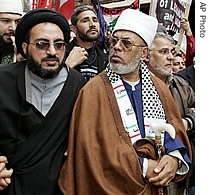2007年VOA标准英语-Young Australian Muslims Want Homegrown Imams(在线收听)
Sydney
26 July 2007
Australia's Muslims want to move away from the practice of importing imams. Most senior clerics here were born in the Middle East - some do not speak English and are seen as out of touch with modern Australia. Many mosques have employed them believing they have greater knowledge and more authority than locals. But observers believe a new generation of homegrown clerics, able to surf and play rugby, can connect better with young Muslims and help limit the appeal of extremism. From Sydney, Phil Mercer reports.
Moderate imams are on the front-line in efforts to stop Muslims in Australia from being seduced by extremism.
Many involved in this effort say the influence of more Australian-born Islamic leaders could be helpful. Kurander Seyit, who publishes an Islamic newspaper in Sydney, says the practice of importing clerics from abroad is out-dated.
"Unfortunately we are still reverting to getting people who are probably in their late, you know, middle-aged imams who have hardened ideas about life and very hard to change them when they come to Australia. It's, you know, a total culture clash and so that's the problem," he said. "We've got people from overseas not understanding the mentality of Australia so it's really important we do get these people who are homegrown."
Ideas to increase the number of Australian-born clerics include setting up a seminary or encouraging mosques to set up in-house training courses.
Thirty-three-year-old Haisam Farache is one of a rare breed. Born in Australia, he is the imam at one of Sydney's biggest mosques.
While he appreciates the wisdom of the foreign clerics, he believes that many lack a true understanding of Australian values and culture.
"They memorize the whole Koran and they learn all the body of jurisprudence and all the different traditions and the different teachings of Islam so they come with a wealth of knowledge and a wealth of experience," he said. "There is also a period of trying to understand what's going on in the community and when they come here generally, the imams and the scholars they come into their own communities and there's a sense that they haven't actually hit the mainstream of Australian society."
Farache lists surfing and rugby as his hobbies, which newspaper publisher Seyit says enhances his ability to connect with young Muslims.
"That's worth its weight in gold - to find someone who can relate to someone else about sport or understand the politics of this country, be able to talk about what young kids want to talk about; music and fashions and cars," said Seyit. "That's really important. Our old imams can't do that."
There are about 350,000 Muslims in Australia. It is a diverse community with many immigrant members from as far away as Africa, Indonesia, Pakistan and the Middle East.
Traditionally imams have been imported. But many do not speak fluent English.
 |
| Sheik Taj el Din al-Hilali, in brown cape, joins members of Sydney's Lebanese community in a march through Sydney's central business district in this July 2006 file photo |
The new leader of Australia's Muslims - Lebanese-born Sheikh Fehmi Naji El-Imam - says his predecessor was treated unfairly.
"I don't know if the Mufti Hilali was addressing the Australian girls or women in particular, because when he talked about this he was talking to the Muslim community inside the mosque, in a sermon," he said. "So maybe he wants to advise the Muslim community not to do the same thing, spoil themselves to the sun, maybe because possible skin cancer in the future and things like that, who knows? He was misunderstood all the time."
Abdul Waleed is an American cleric employed by Sydney's Turkish community. He is a convert to Islam and believes that foreign-born religious leaders with a good grasp of English do have a positive part to play here.
He says he has few problems connecting with his congregation.
"I studied overseas in Turkey and in Saudi Arabia and I studied traditionally. The books I've read all these people read themselves, the texts on theology I've read they've read themselves. But of course my background is different culturally and I am different that way and therefore I bring that into my reading also," he said. "For example, as you saw today as I spoke, you know, I didn't quote anything that they've probably not heard before - those verses of the Koran or those narrations - but how I put them together and the message I wanted to give they've probably not heard it that way though."
There are signs that the message from Islamic teachers - whether homegrown or from overseas - is a calming influence on many young Australian Muslims.
Haisam Farache believes that during these troubled times - marked by recent bomb plots in Britain and continued unrest in the Middle East - many are seeking enlightenment.
"In fact, the spirit is the most important thing and so people - they're starting to realize that. And once they start to realize that they go on that search and I went on that search looking for what made me content and what made me relaxed and what made me at peace," said Farache. "And I think people are searching for that and all the turmoil that's going on in the world is only pushing people more towards that."
Australia's Muslims say their brand of Islam is inherently more relaxed and moderate than the traditions found in the Middle East or Europe. They point to the country's easy-going lifestyle and believe it rubs off on their religious practices. For some it is a reason to persuade the mosques to nurture homegrown talent rather than import Imams from abroad.